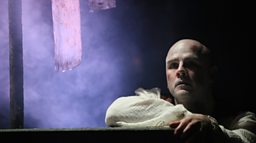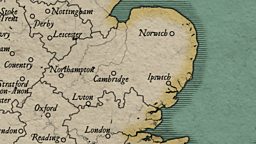Modern day Macbeth for Corby steel town
It’s not just a play about murder, malevolence and “Mrs” Macbeth, this innovative production posed questions about betrayal, bullying and friendship that school pupils could relate to their lives today.
-
![]()
Much ado near me
Hear more Shakespeare stories on BBC Radio Northampton
-
![]()
Shakespeare Festival 2016
The BBC celebrates the genius of the bard

Here's a knocking indeed!
If a man were porter of hell-gate, he should have old turning the key.
Macbeth, Act 2, Scene 3
During 2013 and 2014 over 15,000 people saw a ground-breaking Macbeth which centred on the porter as the main character in the drama. Writer and director Nick Walker at The Core, at Corby Cube, worked with producers China Plate and Contender Charlie to create a spell-binding Macbeth - which toured to venues from Ipswich to Sunderland.
Over 15,000 young people and their families, teachers and carers watched his adaptation in which the role of the porter was, quite literally, key.
As the gate-keeper of Macbeth’s castle, the porter follows the comings and goings of the lead characters and is able to inject their entrances and exits with (black) comedy and suspense. He’s still drunk from the party the night before and complains that his job is worse than the porter at the gates of hell. In a moment of pure stand-up he imagines opening and closing the gates on the souls who are damned. But it’s not really a joke, as the characters who come and go under his beady eye are just as doomed by their lust for power, blood and revenge as the lost souls in his story.
The latest technology was used to conjure up the other characters, including a digital screen which projected scenes from the play.
Walker’s aim was to open the play up to school pupils in the audience and encourage them to explore dilemmas that resonated with their daily lives. Ambition, bullying, the abuse of power, and the meaning of loyalty were pertinent issues raised by the production. It was shown to 9 and 10 year olds and each performance was followed by a discussion where the children talked about the characters and how such big questions related to their lives at home and school.
Big dramatic moments such as when Macbeth kills his best friend were used as a springboard to talk about how the play depicts friendship and betrayal.
However Walker didn’t see the production as providing some kind of “Shakespeare therapy” – his goal was to encourage younger audiences to enjoy, explore but above all make a connection with the work of our greatest dramatist.
The choice of “The Scottish Play” was an obvious nod to the make-up of Corby and those workers from north of the border who had poured into the town to work in the steel industry. They and their off-spring, now parents themselves may have been among the audience.
Like the play, and in common with many other post-industrial towns, Corby is wrestling with big issues such as the search for identity and the fight for a future.
The Core at Corby Cube is the main arts venue in Corby and sister theatre of Royal and Derngate, Northampton. Nick Walker is currently working on a production of Romeo and Juliet which will explore the question of divided communities. It will tour in 2017.
-
![]()
Shakespeare Lives
The nation’s greatest performing arts institutions mark 400 years since the Bard's death

Related Links

Shakespeare on Tour: Around Northampton
-
![]()
Iconic Magna Carta Performance of King John
Marking the 800 year anniversary of the Magna Carta
-
![]()
King Lear with a happy ending in Kettering
The Shakespeare adaptation loved by spectators and loathed by critics
-
![]()
The Northampton Repertory Theatre
Pieces of history in Northampton
-
![]()
Shakespeare teased Daventry…and the comedy carries on
Tired travellers treated to The Taming of the Shrew
Shakespeare on Tour: Around the country
-
![]()
Lancaster Theatre sparkles with Shakespearean talent
The Grand Theatre in Lancaster, which was once managed by Stephen Kemble
-
![]()
Reading’s Puritans turn away Shakespeare
Shakespeare's men paid not to play in Reading
-
![]()
Belvoir Castle
Belvoir Castle, home of the Duke of Rutland
-
![]()
Did Shakespeare visit Bristol in 1597?
Civic accounts show a high amount of performances in Bath











